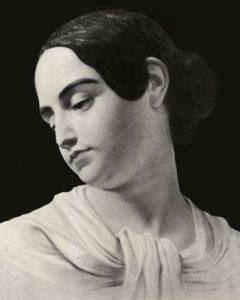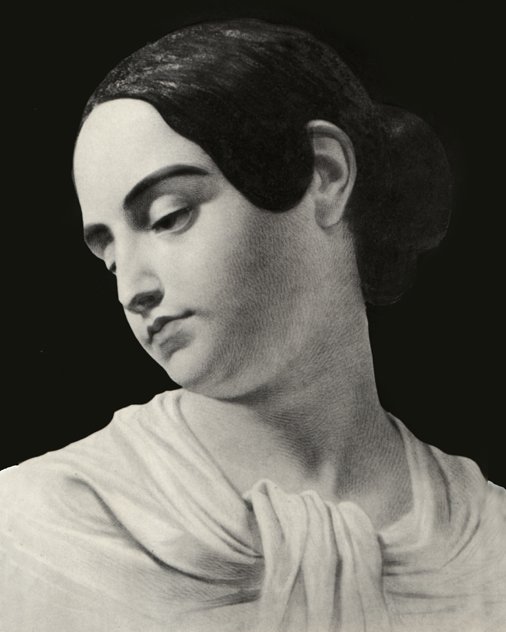Written by Rob Velella, August 15, 2009, as part of “The Edgar A. Poe Calendar: 365 Days of the Master of the Macabre and the Mystery“
 Happy birthday to Virginia Eliza Clemm, who was born August 15, 1822.* She would have been 195 today.
Happy birthday to Virginia Eliza Clemm, who was born August 15, 1822.* She would have been 195 today.
What more can be said about Virginia that hasn’t been said here already? I’ve written about the only surviving letter from Poe to his wife, their unusual marriage (and uncertain anniversary date), and Valentine’s poem she wrote to her husband — just to name a few. Today, I’d like to introduce the Poe work which is most inspired by Virginia. It is not “The Raven,” nor is it “Annabel Lee.” It is, in fact, the short story “Eleonora.”
First published in the 1841 issue of The Gift, the story features an unnamed narrator who lives a life of isolation with his cousin and aunt. The setting is paradisaical, known as the Valley of the Many-Coloured Grass. Untrodden by strangers, the land is full of beautiful flowers and trees as well as a River of Silence. In this paradise, the narrator falls in love with his cousin — but she was sick, “made perfect in loveliness only to die.” She worries that when she dies, her cousin will move on and fall in love with another. He promises that would never happen.
Her death, the narrator says, kicks off “the second era of my existence.” This new life, however, is not as idyllic as it had been. The Valley of the Many-Coloured Grass does not survive after Eleonora’s death:
The star-shaped flowers shrank into the stems of the trees, and appeared no more. The tints of the green carpet faded, and one by one the ruby-red asphodels withered away… And life departed from our paths; for the tall flamingo flaunted no longer his scarlet plumage before us, but flew sadly from the vale into the hills, with all the gay, glowing birds that had arrived in his company. And the golden and silver fish swam down through the gorge at the lower end of our domain, and bedecked the sweet river never again… And then, lastly, the voluminous cloud uprose, and abandoning the tops of the mountains to the dimness of old, fell back into the regions of Hesper, and took away all its manifold golden and gorgeous glories from the Valley of the Many-Coloured Grass.
The narrator leaves and moves to an unnamed city. There, he marries Ermengarde, not fearing the vow he had made. Eleonora appears to him and blesses his new union, saying “Thou art absolved… for reasons which shall be made known to thee in Heaven.”
The story clearly references the idealism Poe had with his marriage (the biggest clue that this story is autobiographical is the inclusion of the aunt/mother-in-law character; she plays no clear role in the story but is a definite reference to Maria Clemm). Virginia was just beginning to show signs of tuberculosis — the illness which would kill her in five years. Poe was already feeling guilty that he might have to consider other women as potential second wives. Jumping the gun a bit? Maybe, but the more important aspect of the story is the idealism of the Valley of the Many-Coloured Grass, and how this paradise dies with the wife.
A couple lines from this story are often quoted, though it doesn’t seem most know the origin of these quotes. This might sound familiar:
Men have called me mad; but the question is not yet settled,whether madness be or be not the loftier intelligence — whether much that is glorious — whether all that is profound — does not spring from disease of thought, from moods of mind exalted at the expense of the general intellect. They who dream by day are cognizant of many things which escape the dreamers by night.
Happy birthday, Virginia.
* I have found one source that lists her birthday as August 22. The majority of sources, however, use the August 15 date.

